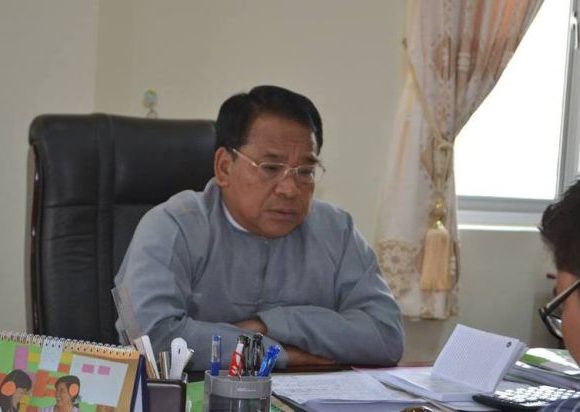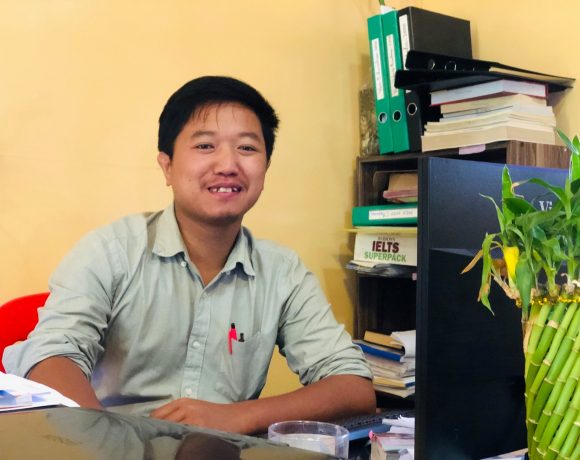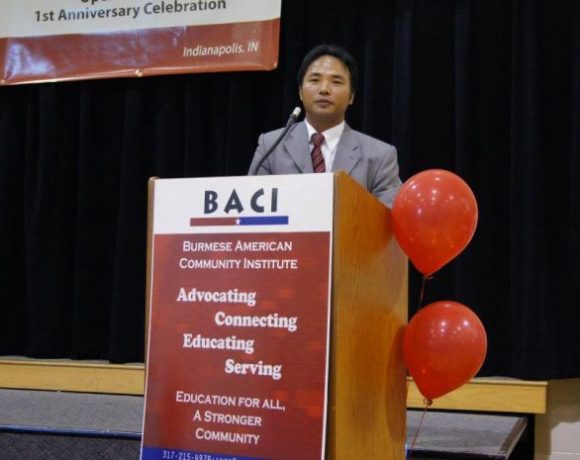Interview With Pado Mahn Shar Lahphan, General Secretary of Karen National Union KNU
November 22, 2002-Pha-an Distric, Kawthulay (KNU 7 Brigade)
Chinland Guardian: It’s nice meeting you Pado, and thank you very much for sparing your time. Let me begin by asking you in brief about your revolutionary background; when did you join the Karen National Union and what were you doing previous to joining the KNU? Pado Mahn Shar: I hail from “Myitwa KyunPaw” Irrawady Delta region, and I belong to western Po Karen, one of the Karen sub-tribes. I started my high school education in Rangoon in 1960, and I graduated from high school in 1962. I joined Rangoon University in June of 1962. The “July Incident” [in which the army of General Ne Win’s Revolutionary Council massacred student demonstrators on the Campus] occurred that very same year. Many students had gone underground by the year 1964, but I decided to remain a student till I completed my degree. I graduated with a Bachelor of Arts in History in 1966. My revolutionary career started that very same year I graduated from University, although my first contacts with the Karen National Union dated back to 1962. I have since been active in the KNU to this day.
Chinland Guardian: Could you describe about what the political goals of the KNU are?
Pado Mahn Shar: Certainly. The political goals of the KNU are to attain the rights of equality and self-determination for the entire Karen people, to establish a Karen State with an equitable and reasonable geographic area, and to establish a genuine Federal Union based on the principles of equality and democracy.
Chinland Guardian: How did the KNU’s retreat from its Headquarters Manerplaw impact the organization politically and militarily?
Pado Mahn Shar: The KNU retreated from Manerplaw on January 26, 1995. After the retreat, there have been problems within the Karen revolution as well as within among the larger Karen population. Many had thought that the Karen revolution had come to an unsuccessful end. Many Karens felt disheartened, abandoned and discontented while others started deserting the revolution by blaming the leadership and so on. The dimension of this feeling actually transcended the Karen people, it created a sense of uncertainty and disheartenment among our allies. This was all because they were not politically experienced or mature enough to realize the fact that there are ups and downs in every revolution.
Chinland Guardian: Would you mind explaining to us the reason why the KNU decided to let go of Manerplaw?
Pado Mahn Shar: After 1988, Manerplaw became the Headquarters of both the KNU and of the revolutionary movement for the entire country, thus becoming the most strategically important target for the [Burmese] military junta. In 1989, the military junta succeeded in terminating the Burma Communist Party (CPB) movement, without a single gun-shot fired, depriving them of both their strongholds and their soldiers. Simultaneously, from 1989 to 1994, the junta, again without having to fire a single bullet, succeeded in enticing over ten ethnic armed organizations to be placed under its control. These two events gave the SLORC the ability to mobilize both its troops and weapons from the entire country to use for the offensive against Manerplaw. On the other hand, decades of continuous resistance had begun to exhaust our energy, weaponry and economy. Under such circumstances, the SLORC was also able to create religious tension within the KNU. All of these combined, constitute some of the primary factors that led us to give up Marneplaw.
Chinland Guardian: Have there been any proposals made by Rangoon for peace talks with the KNU?
Pado Mahn Shar: Since 1949, the KNU has held talks with Rangoon on four different occasions. The first one was in 1949. Another meeting was held in 1960 with General Ne Win’s Care Taker Government. And the third meeting occurred during the Revolutionary Council era. The last one was in 1996 with the State Law and Restoration Council. There were four meetings in the latest phase of talks with the SLORC including the preliminary meetings. But the negotiation became unsuccessful because all the SLORC wanted was the unconditional and unilateral surrender of arms by the KNU. This was something we could not just accept, and that’s the reason why the SLORC unilaterally pulled out from the talks and started intensifying military offensive against the KNU. Since 1997, neither the SLORC nor SPDC has made any meaningful proposals for peace talks with us.
Chinland Guardian: “Tripartite Dialogue” is a terminology that enjoys a great deal of popularity as being the most potentially effective and viable means of solving the present political crisis in Burma. What is your view on this?
Pado Mahn Shar: The idea of “Tripartite Dialogue” was first agreed upon in 1994 as a means of justly solving the political problems in Burma. The KNU also supported the idea. The reason why we supported this idea is that “Tripartite Dialogue” appears to be the most viable means requiring the least blood-shed, in justly and equitably resolving the fundamental political problems of Burma. Eight years have elapsed now since the concept of “Tripartite Dialogue” emerged, but it has yet to be followed through. This is because the SPDC has constantly been against it. For the Tripartite Dialogue to be realized, effective pressures have to be exerted on SPDC from all sides.
Chinland Guardian: Should Tripartite Dialogue really occur, would the KNU represent the Karen State in the dialogue?
Pado Mahn Shar: If that really happens, and is a free and fair one, the KNU will take part in the dialogue after making thorough consultation with the entire Karen people. There is no such concept as representing the Karen State. It is so because of a number of reasons. First, the present geographic area of Karen State is not a just demarcation. Second, granted we have a just and reasonable territory, most of the Karen people would find themselves living outside of their own territory [due to dispersed inhabitation].
Chinland Guardian: How do you see the role of the United Nationalities League for Democracy (UNLD) and the National Democratic Front (NDF) in the current political scenario of Burma?
Pado Mahn Shar: The formation of UNLD by urban-based ethnic political parties in the wake of the 1988 political crisis, was something history has demanded. Working for national unity and for the establishment of a genuine Union are important tasks. The outlawing of UNLD was an extreme act on the part of SPDC. NDF, on the other hand, is a military alliance composed of ethnic armed resistance groups which has been struggling since 1948-49 for their national self-determination and for the establishment of a genuine Union. This alliance has served as the solid backbone of the ethnic nationalities. NDF itself was born with the flow of the present political situations. With the re-emergence of UNLD as UNLD (Liberated Area), cooperation between UNLD (LA) and the NDF became a matter of necessity. This kind of cooperation is very important in our struggle for regaining the basic rights of the ethnic nationalities, and we are constantly working towards strengthening and bolstering our cooperation.
Chinland Guardian: Some of the ethnic armed groups have signed cease-fire deals with the military regime. Has the KNU, either directly or indirectly, been affected by the strategy in which the cease-fire deal was used by Rangoon?
Pado Mahn Shar: KNU has been greatly affected by the cease-fire agreements between the junta and some ethnic armed groups since 1990. In essence, it has had tremendous effects on the whole ethnic nationalities both politically and militarily. Moreover, looking at the way these very cease-fire groups have been strictly constrained, diminished and destroyed in various ways by the SPDC, they are also greatly affected.
Chinland Guardian: Ethnic nationalities are now considerably dispersed in terms of their inhabitation and this, as well, is something the regime has deliberately created. In your view, under the current circumstances, what should be the most feasible political basis on which to reorganize the dispersed people, and in what way these people can best be guaranteed their basic political rights?
Pado Mahn Shar: I think the best guarantee is a system of democracy and genuine Federal Union based on the principles of ethnic equality and self-determination.
Chinland Guardian: We hear the SPDC constantly asserting that the ethnic nationalities are the ones who only try to break up the Union. What do you want to say to that?
Pado Mahn Shar: The nation has already broken into pieces . Even within the army, which is constantly chanting the slogan of “We will never break apart even if everyone else does,” the break-up is quite evident. The same is true even within the Military Intelligence Service. The ethnic nationalities never really broke away from the Union during the last fifty years of the nation‘s history. In reality, it is the SPDC and successive military regimes that have actually broken away and alienated themselves from the nation in order to enjoy special privileges.
Chinland Guardian: Could you please share with us your views on the future of Burma?
Pado Mahn Shar: Simply put. So long as we can’t get rid of the chauvinistic military dictatorship, the prospect of the future of Burma is very dim. I think that the current military regime no longer has the ability to control the nation as well as its armed forces. For us to get rid of the military dictatorship, the entire people should rise up to be united against the regime. Only then can we build a genuine Federal Union, which will serve the best interest of the entire nation.
Chinland Guardian: Thank you very much for your time.
Pado Mahn Shar: You are most welcome.
(Note: this interview was conducted by Salai Bawi Lian Mang at Karen National Union (KNU) 7 Brigade and translated by Salai Za Uk Ling from original Burmese version)






